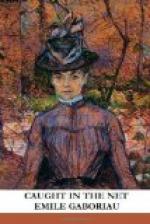This time the arrow went home. She grew deadly pale, and started to her feet with her eyes dilated with horror.
“My letters!” exclaimed she hoarsely.
Hortebise appeared utterly overwhelmed by this display of consternation, of which he was the innocent cause.
“Your letters, madame,” replied he with evident hesitation, “this double-dyed scoundrel declares he has in his possession.”
With a cry like that of a wounded lioness, the Countess, taking no notice of the doctor’s presence, rushed from the room. Her rapid footfall could be heard on the stairs, and the rustle of her silken skirts against the banisters. As soon as he was left alone, the doctor rose from his seat with a cynical smile upon his face.
“You may search,” mused he, “but you will find that the birds have flown.” He walked up to one of the windows, and drummed on the glass with his fingers. “People say,” remarked he, “that Mascarin never makes a mistake. One cannot help admiring his diabolical sagacity and unfailing logic. From the most trivial event he forges a long chain of evidence, as the botanist is able, as he picks up a withered leaf, to describe in detail the tree it came from. A pity, almost, that he did not turn his talents to some nobler end; but no; he is now upstairs putting the Count on the rack, while I am inflicting tortures on the Countess. What a shameful business we are carrying on! There are moments when I think that I have paid dearly for my life of luxury, for I know well,” he added, half consciously fingering his locket, “that some day we shall meet some one stronger than ourselves, and then the inevitable will ensue.”
The reappearance of the Countess broke the chain of his thoughts. Her hair was disturbed, her eyes had a wild look in them, and everything about her betrayed the state of agitation she was in.
“Robbed! robbed!” cried she, as she entered the room. Her excitement was so extreme that she spoke aloud, forgetting that the door was open, and that the lackey in the ante-room could hear all she said. Luckily Hortebise did not lose his presence of mind, and, with the ease of a leading actor repairing the error of a subordinate, he closed the door.
“What have you lost?” asked he.
“My letters; they are all gone.”
She staggered on to a couch, and in broken accents went on. “And yet these letters were in an iron casket closed by a secret spring; that casket was in a drawer, the key of which never leaves me.”
“Good heavens!” exclaimed Hortebise in affected tones, “then Tantaine spoke the truth.”
“He did,” answered the Countess hoarsely. “Yes,” she continued, “I am the bondslave to people whose names I do not even know, who can control my every movement and action.”
She hid her face in her hands as though her pride sought to conceal her despair.
“Are these letters, then, so terribly compromising?” asked the doctor.




